
Leany on Life -- Latest Blog Entry
I may not agree with your opinion, but I will defend to the death my right to ridicule it.
Leany home | Articles | Chronicles | Prostitution Arrests | Who is Frank Leany? | Libotomies |
Refresh to get latest blog entry |
The Finest Irritainment on the Net
Past Blogs
October 2017September 2017
August 2017
July 2017
June 2017
April 2017
January 2017
December 2016
November 2016
October 2016
August 2016
July 2016
June 2016
May 2016
April 2016
March 2016
February 2016
January 2016
December 2015
November 2015
October 2015
September 2015
August 2015
July 2015
June 2015
May 2015
April 2015
March 2015
February 2015
January 2015
December 2014
November 2014
August 2014
July 2014
May 2014
April 2014
March 2014
February 2014
January 2014
December 2013
November 2013
October 2013
September 2013
July 2013
June 2013
May 2013
April 2013
March 2013
February 2013
January 2013
December 2012
November 2012
October 2012
September 2012
August 2012
July 2012
June 2012
May 2012
April 2012
March 2012
February 2012
January 2012
December 2011
November 2011
October 2011
September 2011
August 2011
July 2011
June 2011
May 2011
April 2011
March 2011
February 2011
January 2011
December 2010
November 2010
October 2010
September 2010
August 2010
July 2010
June 2010
May 2010
April 2010
March 2010
February 2010
January 2010
December 2009
November 2009
October 2009
September 2009
August 2009
July 2009
June 2009
May 2009
April 2009
March 2009
February 2009
January 2009
Five vignettes
1.19.2020
You know how this site works—I'm all about information and understanding here.Don't you love learning new things--having things pop into focus in a way that you didn't see before?
Today I'm going to give you some in-depth, maybe even somewhat secret, knowledge that I can guarantee you've never seen explained before.
But first, you have to sit through a lot of really boring pre-ramble, 'cause . . . hey, it's me. That's what I do.
Sadly enough, racism still exists. Honestly, it probably always will.
And race hoaxes probably always will, too. You see these stories on the news and it makes you sad, because every time someone tries to manufacture a racist situation it makes society think racism no longer exists. If you have to fake it then it must not be real. This crap ('cause this is a high-end journalist endeavor here. We characterize things as 'crap') undermines generations of efforts to bring awareness to how awful that attitude is.
But there's good news!
I have tirelessly and diligently "researched" until I've found explanations for some of the more high profile race hoax stories. These are stories that at first glance seemed like ridiculous, even stupid, completely transparent, silly, and nonsensical hoaxes.
When you understand the real explanation you'll feel much better. Your newfound insight will give you a sense of calm that other lesser mortals may never feel.
Chapter 1. Barrels
Back in October of 2017 Florida representative Frederica Wilson was bloviating about being instrumental in getting the funding for some building, or something, doesn’t matter. White House Chief of staff John Kelly pointed out that an empty barrel makes the most noise.Barrels ExplainedWell of course Rep. Wilson, who happens to be a woman of color, wasn’t going to sit still for that. She pointed out how racist it was to use that phrase. Racist, I tells ya!
Now those lesser mortals I referred to might be scratching their heads thinking "What in the name of Monty J. Python is racist about an empty barrel?!"
Those Philistines.
You, as an enlightened Leany on Life follower know the history—or you soon will.
Back when people traveled on sailing ships provisions were somewhat scarce. The ships took a long time coming across the ocean and they weren’t all that spacious. What food they had was typically stored in barrels to try to preserve it.Chapter 2. BaltimoreCrackers were a main staple because they kept well and were filling for the amount of space they took up.
On slave ships conditions were especially dire. The white crew would often take more than their share from these cracker barrels (which, as you might imagine, is where the derisive term "cracker" for a white person comes from). You might also recall the Great Slave Ship Rebellion of 15911 (which, oddly enough, literally nobody ever talks about. Weird).
This uprising was caused by the white crew eating all the crackers, leaving the barrel empty, which resulted in a lot of "noise" from the rebellion.
Now you know not only the source of the saying, but also why Rep. Wilson’s utterly and absurdly ridiculous, stupid, senseless, desperately grasping at straws -sounding assertions were spot on. Kudos to the good congresswoman for knowing her history.
1Source:
"Sources? We don’t need no stinking sources!"
An imaginary book by Frank Leany.
In July of 2019 Elijah Cummings was prattling on about something or another. Who knows? President Trump pointed out that maybe Cummings should concentrate on his own district, Baltimore, which was rat-infested.Baltimore ExplainedThe mayor of Baltimore, among others (Nancy Pelosi), responded with "Racist much?" They were incensed that Trump would use such an obvious racially loaded word as "rats."
Now, many of the less enlightened among us might be completely bewildered, thinking "What in the %$&#*@ is racist about saying a city has rats?" (Particularly a city that happens to be infested with the rodents). To those poor, unenlightened souls it may seem like there’s absolutely no link between rats and racism.
But you are about the hear . . . the rest of the story. (Cultural appropriation much?—What am I, trying to pretend like I’m an old white guy Oh . . . wait . . . )
Back in the early days of the Colonial South many plantation owners used to have their carriages drawn by rats. Oddly enough, you don’t see this in any of the history books.2 As you can imagine, it takes a good number of rats to pull a carriage. The number of rats that these slave owners had was a status symbol. The more rats you had the more respected you were.Chapter 3. Bashing BrownsAs an interesting aside, when the slaves would hear the tiny hoofbeats of the rats they knew that the master was coming, and they’d say "Oh, rats!" a saying that continues to this day as an expression when something goes wrong.
So, you see, that the absolutely ridiculous utterly stupid, meaningless, moronic and idiotic -sounding charges of racism against someone for saying that Baltimore has rats is actually a reflection of a deep knowledge of some little-known American history.
2 "Sources Schmources!" An imaginary book by Frank Leany.
On November 14, 2019, Cleveland Browns defensive end Myles Garrett tore the helmet off Steelers quarterback Mason Rudolph and hit him in the head with it. He tore off the quarterback's helmet and hit him in the head with it.Bashing ExplainedThis kind of criminal behavior is not something that we commonly think of as part of the game of football. From a policy standpoint it results in suspension. As a matter of policy it should result in being removed from the sport and jail time. From a practical standpoint it should result in the end of a career, because no manager wants the liability of having a crazy man on the team.
When it happened Garrett expressed shock and disbelief that he had done that, saying there was no excuse for his behavior.
Six days later—almost a week, for those of you keeping score at home, Garrett suddenly remembered that Mason had made a racist comment which justified him being hit in the head by a hard object.
Oh, did I mention that Garrett is black and the quarterback he assaulted is white?3
Now, I know that it sounds like Garrett made up the story in the week between the incident and his explanation of racism; I know it sounds like an outright &*$%#!@$% lie and an insult to people who have actually been called racist names. I understand it sounds like a weenie excuse to try to get out of responsibility for intolerable behavior.Chapter 4. BasketballSome people might see a scene in their heads where he is hanging out with his buddies, having some beers, talking about how rotten it is that the whole world saw him lose it like a deranged maniac, and they said "Dude, you don’t have to be suspended. Say it was racism and you can do whatever you want. And anyone who wants to punish you will be a racist, too!"
But you, the enlightened reader of this blog (that is famous from one end of my desk to the other), you understand that things happen so quickly in a fight it’s hard to be sure.
What did in fact happen was that Garrett was the one who got hit with the helmet. In all the confusion he took a hit to the head. All of that delayed memory was a simple matter of a brain injury that caused him to forget for nearly a week that he was the victim in all this.
In fact, I wouldn’t be surprised if some racist altered all 17 video records of the incident to make it look like Mason Rudolph was the one who got hit by the helmet. They can do that you know.4
Garrett is not to be reviled, but to be pitied. Poor little guy, got an owie to the head, messed up his memory for a week.
3Wait a minute! Did I just call a black man crazy?
No. No, dear reader, I called a person crazy. Recall that people have fought for generations to get people of all colors to be on the same status as all other people. I am honoring that heritage.4Source: The imaginary book "Fascinating 'Facts' The Trilateral Commission Doesn't Want You to Know" by Frank Leany
In March of 2019 Shane Keisel was at a Jazz basketball game in the Vivint Arena in Salt Lake City and yelled something at Russell Westbrook of the OKC Thunder. Westbrook says Keisel told him something like "Get on your knees like you’re used to."Basketball ExplainedNow, you and me, and almost everybody on the planet would hear that and think that it’s a deplorable sexual comment. A crass, not clever, disgusting sexual comment.
But hold on . . .
See, Keisel didn’t yell at just any NBA player that was playing against his team. He specifically singled out the black NBA player in the arena.
Still think it was sexual?
Keisel obviously is a schmuck, has anger management issues, and is probably abusive to his family, but we wouldn’t have known he’s a racist but for the sharp eyes of the media. They "reported" that Keisel made a racial comment. They didn’t want you to have to bother with what the actual comment was, save you the trouble of thinking and possibly coming to the wrong conclusion. No, it’s enough that you know it was a racial comment.
You might think that Keisel is a moron. You might think he’s just not in control of his emotions and he said something without thinking. To believe that is to discount the genius of the man.Chapter 5. Betrayed!See, this kind of dog whistle trick is what I’ve described as the veiled finger. When you scratch your nose with your middle finger, the person you’re directing it at knows you’re flipping him off, but everyone else just thinks you're scratching your nose. And best of all, he can't call you on it, 'cause if he does he sounds crazy. "What? You’re paranoid, dude. I was just scratching my nose. Sheesh."
So anybody and everybody listening would think that was a sexual comment. But Westbrook knew. Oh, he knew!
But oddly enough Keisel’s carefully thought out plan didn’t work. The owners of the Vivint Arena didn’t say "What? You’re misinterpreting that." They saw through Keisel’s cleverness, understood that he meant is as a racial slur, and banned him for life from any event in the arena.
'Cause we don’t tolerate racism here in Salt Lake City.
They didn’t ban Westbrook. Shouting for everyone in the arena to hear that he would "F— up" Keisel’s wife (his girlfriend) wasn’t racial, so it was cool.5 There’s just no lore that would support the idea that a black man yelling that at a white woman is a racially loaded statement.
So now you know.
5The NBA did fine Westbrook 25K. I'm gonna say that's about right. Doesn't really make a dent in his salary but still enough money to let him know that when you represent the NBA you don't behave like that.
On January 29, 2019, Jussie Smollet staged an attack on himself, then reported to the police that he was attacked by two white men who made racial and homophobic slurs.Betrayal ExplainedAfter an extensive police investigation involving lots of overtime, and lots of press coverage about how horrible it was that Smollet had been a victim of such horrible racism, it was discovered that Smollet faked the whole thing.
When that became public Smollet said that he had been "Betrayed by the system."
Now, before you get all incensed and outraged thinking “The gall of that &*%$^ lying sack of *&%$#, getting all butt hurt after he caused the problem and damaged the credibility of legitimate victims of racism!” stop and open your mind. Think about it. The guy felt betrayed, when it seems like he’s the one doing all the betraying. Maybe there’s more to the story that we’re not seeing.
This one took some deep research.6ConclusionWhat was not reported in the press for some reason is that Smollet had been kidnapped by the Romulans. They used very high tech cerebral probes to brainwash him into staging this attack. You know the Romulans are capable of that. Unless you’re not a follower of Alex Jones or Coast to Coast with George Norry. Then you may not be aware this sort of thing goes on. But that’s what those dirty scoundrels do. (Ugh, it’s just offensive that they have a common heritage with the Vulcans)
This was to be the final move in the Romulan ploy to get this planet to realize once and for all that racism is bad, a necessary step in order for them to come take over our little planet.
The Romulans didn’t count on their plan being discovered, and when it was they hung Smollet out to dry.
See? Wouldn’t you also feel betrayed if that happened to you? Very betrayed, omigosh.
The poor guy. He was victimized twice. Once by his fake attackers then again by the Romulans when they let him twist in the wind. Oh, I guess three times, cause those dirty rat &*^%#$ first kidnapped him and stuck those needles in his head.
6"Out of Thin Air: the Internet Source Book"
An imaginary book by Frank LeanyFor generations people have marched and fought and gotten beaten up in an effort to make "racist" one of the worst things a person could be. In less than a generation fools have reduced the word to being meaningless. Now it's a word you use when you disagree with someone and you're too stupid to explain why.This situation is further exacerbated by race hoaxes. If you didn’t know the history you might think that these are examples of "When everything is racist, nothing is." You might be concerned that all of this crying racism in cases when it doesn’t exist is detrimental to the cause of eradicating the racism that does exist.
You might even think that these people are perpetrating a hoax that allows the wolf to feast on the flock because the boy who cried “Wolf!” has lost his credibility.
But, as you see, it’s merely a lack of understanding of history. All of these ludicrous, preposterous, silly, laughable outrageous, ridiculous -sounding charges of racism have an actual background in history. You just have to understand what . . . you know . . . makes up history . . . so to speak.
Wrong
9.23.18
Hey, here's something interesting. Did you know they have stations on the radio that play music?It's true.
I think it's time for me to return to that part of the radio dial.
I really wish I had placed my bet. I really wish I had taken my entire life savings and wagered that another "victim" was going to come forward and say she'd been assaulted by the man the demorats are desperately trying to keep off the Supreme Court.
Yeah, I'm going to tell you, she's lying.
She wasn't sure, but after spending six days with a lawyer she's been able to recall that Brett Kavanaugh did something inappropriate to her.
Did I mention that she's lying?
Yesterday I was listening to a radio show where two people were discussing the first accusation against Brett Kavanaugh. At this point I don't think anyone was even aware of the second fabrication against him. One gal was being all analytical about it. "It's terrible either way, because even if his nomination gets derailed that doesn't fix this terrible thing he did to this girl."
I am not making this up. This is what passes for discussion these days. I just . . . what can you say? Like hearing someone basing a premise on "Since it is a known fact that Pepsi is better than Coke . . ."
I mean, if you can come up with a scenario where a Pepsi preference wrecks someone's life.
Like I said, this is what I love about Free Speech. This is very helpful information to have when you turn on a radio and hear someone giving you analysis. Free Speech is like the ingredients statement on your food. Nope, not going to partake of that crap.
Oh, but she did make her case. Her evidence that Kavanaugh is a rapist is "Why would she make it up?"
To help her understand, I'll quote the insight of a prominent demorat discounting claims of sexual assault against Bill Clinton. "This is what you get when you drag a dollar bill through a trailer court."
She didn't make it up. A whole team of demorat operatives made it up. They orchestrated this a long time ago; it's a staple in their playbook. She is just the one they selected to play the part when they hammered out the details and opened the production.
You honestly don't see the upside of landing that role? As Carville knows, since his job was to implement just those sorts of things, the DNC has specific budget items for enticing people that play those roles.
Understand I'm not doing what that gal on the radio did. I can't know for certain. But said gal and her ilk have increased my certainty from about 65% when the news came out to over 90% now.
New Title
Since I got clear through he last post without getting to the point of the last title.The point was the other guy who was having the discussion with the girl who just knew Kavanaugh was a rapist, 'cause men are rapists and girls don't make things up.
Uh-oh, another tangent coming . . .
I was standing in line to come in from recess. I was in the third grade. Smiling, sun was shining, exhilarated from the playground, life was good. Suddenly a teacher yanked me by the arm and angrily drug me to the back of the line. Her face was a picture of rage. Tammy Sue had told her that I pushed her and took cuts.
I was confused. I hadn't been anywhere near Tammy Sue.
I tried to protest my innocence, but that made the teacher madder. I was not only a line cutting shover of little girls, I was a liar, too!
Life lesson learned as I saw the smug look on Tammy Sue's face as she took my place toward the front of the line.
Are we ready for the point yet?
So the girl on the radio has already passed up the whole messy nuisance of the Presumption of Innocence, and the guy weighs in. "Well, on the one hand, it would be awful if he did do this. But we want to be fair to Kavanaugh."
That's a little better--well, a lot better, 'cause he at lease said "if." But it's still the wrong reason for him and his clueless little friend to take that position (thus the title of the first post, which, doggone it, I can't correct since I've already typed it in).
For people who are posing as Social Justice Warriors, virtue signalling about how wonderful they are for standing up for the downtrodden, the most utilitarian reason to get to the truth is what I'm always flapping my gums about.
False accusations of sexual assault harm sexual assault victims.Print that out. Duct tape it to the bumper of your Audi.The reason that what the demorats are doing is so evil is because it undermines legitimate claims of sexual assault (You know, in addition to ruining a man's life for political gain).
They don't care. Sexual assault is such a horrible, unpardonable thing that they are mesmerized by the power. They don't give one micrcrap that when legitimate victims of sexual assault have the courage to come forward (as did the victims of Bill Clinton) we are increasingly liable to say "Yeah, yeah, I'm not falling for that one again."
What's the life of this tactic? How many more times can they pull this before all the fizz is gone from that soda?
Consequences
Action/reaction. Do this, that happens. One of the basic laws of the Universe.Make up a sexual assault claim for political positioning, victims suffer.
Install a President for reasons having nothing to do with his ability, shut down anyone on the other side from being a part of the political discourse, Donald Trump becomes President.
Understand that I understand what comes next.
Establish Donald Trump as what a Republican is, and no reasonable person votes for a Republican.
Just know I understand that.
I'm not happy about it. But the nature of "democracy" is that you don't always get your way.
Take This Jack and . . .
A guy is driving down a lonely country highway one evening, and has a flat tire. He gets out to change the tire and discovers he doesn't have a jack. He sees a light in a farmhouse across a large field and decides to make his way over to borrow a jack.While he's walking he's imagining what the farmer is going to say. "Why don't you have a jack? What kind of motorist ventures out with being prepared?"
So the motorist is getting pretty upset that the farmer is making judgments about a guy he doesn't even know, who just had some bad luck, when he sees the light go out.
"Oh, great!" he thinks. "Now, in addition to giving me grief about not having a jack he's going to be upset about being woken up."
The guy gets to the house and knocks on the door. After a minute the upstairs window opens and a man puts his head out and says "Yes?"
The guy says "You take your jack and you know what you can do with it!"
"You"
I tell you that story because, as you know (dear imaginary reader), that's what I do.The nature of this format is that I'm writing both sides of the dialog, but the other doesn't get typed in. It's all working out in my head.
So I say something, then I imagine "your" reaction, "you" being the imaginary liberal who (like the other 7.5 billion people on this planet) is not reading this.
So I question whether someone who was coached for six days by specially selected lawyers really has a valid claim against the man who the lawyers are getting paid to ruin.
"You" freak out about how insensitive I am to the plight of woman and the depravity of the male.
Sounds like you've got it all figured out. That must be pretty cool for you, not having to think any more about it or consider any other possibilities. Go you.
But if you're entitled to your opinion (I got tired of the quotation marks--know they're there when I speak of the imaginary "you") I'm entitled to mine, which is that you're not helping the people you claim to care about.
There are a lot of victimized women out there--it's horrifying the way a lot of men treat women. In awful overt ways and in more subtle abusive ways.
There are a lot of really bad men out there. It's criminal and I hope I'm there to watch when those men get thrown into a cage with zombies who are going to chew their faces off.
Not that I care what "you" think. I guess I don't suffer any more from you being wrong than I benefit from setting you straight. But I wonder if your viewpoint might benefit from the understanding of the damage you're doing by supporting false accusations.
And They Said It Couldn't Be Done
9.18.18
I've finally done it. I've come up with the dumbest mnemonic ever.You know when your friends come over and you want to make music together? It works fine as long as you're playing the piano and guitar and violin. And flute.
But when someone wants to break out a trumpet or sax or French horn, you have to transpose.
Most people can probably just do that automatically in their heads, but I'm not that bright. I have to think it through. So here's the mnemonic:
The piano is flat. We're talking about a baby grand with the lid closed. The instruments are sharp. Imagine the ligature and reed of the alto sax. It's pointy. The trumpet is kind of pointy, but not as much as the sax. And the French horn isn't really pointy, but, work with me here, it's sharper than the piano.
So to transpose from concert (piano) to French horn you go sharp one step around the circle of fifths. The trumpet takes you two places around. And to transpose to the Eb Alto Sax you go sharp three places.
Same thing going back the other way. If you're moving from the alto sax to the piano you go flat, the other way around the circle of fifths, three places. Past the trumpet, past the horn, to the piano (which, as you recall, is nice and flat with the lid closed). The trumpet key goes two steps flatter than its notation to see what the piano is playing. And the horn key goes one step flatter to get to the piano.
Example, you're playing the French Horn, your music is in F, the piano is one step more flat. Bb. If you're playing the piano in Bb, the saxophone is three steps sharper: Key of G.
Okay, I know, the clarinet is a Bb instrument, too, and it's more pointy than any of them. And the Tenor sax is about as pointy as an alto sax, and it's in Bb, too. But we're just going to use the trumpet to represent all the Bb instruments. If it made perfect sense it wouldn’t win the Dumbest Mnemonic Ever award.
Or you could just print off this handy little transposing gadget and keep it in your piano bench. Or instrument case. (Or find an electronic version for your phone create by someone other than this guy who still doesn't own a pair of brown dress shoes or skinny jeans.)
But if you're looking for something you can carry around in your brain, try this dumb mnemonic.
Practice it. I'll even post some worksheets to the resources page.
Freedom of Speech
I've flapped my gums about this a lot in the past. The greatest thing about Freedom of Speech is that it allows people to reveal themselves.Look, if a guy is a racist don't you want to know that? If a lot of people had their way the racist wouldn't be allowed to demonstrate that he's a troglodyte. You'd see him over there behaving, saying all the proper society-sanctioned things, and figure he's okay.
Really? Think, McFly! Is that what you want?
Stupidest thing ever.
You see those Facebook posts with pictures of those loser with their pants showing their underwear. "Like if you think these should be banned!"
No. Oh, hell no! If you take away all the ways people can reveal who they are, how do you know? (Like bloggers who call fellow human beings "losers" because they show their underwear. See how useful it is?) It's rare that I see the word "ban" and don't disregard anything within blast radius of it.
I freaking love Freedom of Speech. Not just 'cause it allows me spout off on my bla-blah-bla-blah-blog, but mainly because it's how we learn about our fellow man. Otherwise what you "know" about a person is a fabrication and a fantasy.
Yet people continue to advocate silencing people who disagree with them.
When those people, those who think Freedom of Speech means them getting to shout down others who have an opinion, start yelling from the Senate gallery, who do they think they are recruiting? Who says "Oh, I like that point of view. You changed my mind."
(Yeah, old notes. This was from the Kavanaugh hearings. Ed. )
I freaking love those people. Republicans, left to their own devices, would never win anything. They're too milquetoast. We win stuff because the democrats are so anxious to be stupid. Like dressing up in vulva costumes and shouting from the gallery in places where decorum is appropriate.
So I'm all for Freedom of Speech. Shout it up. Show us what you're made of. We could never win elections without you morons opposing us.
Let's Make a Rule
Remember when you went to church and they encouraged you to have sex?Oh, wait . . . am I remembering that right?
Nobody has to make a rule that you have to have sex. Because, duh. It's what people want to do.
We didn't write Freedom of Speech into the Constitution to protect popular speech. Because we didn't have to. That would be stupid.
(Do you like how I made a sex analogy for Freedom of Speech? Hey, it's all immutable laws of the Universe. I figured you were bored with my car analogies.)
(Also, drinking game: whenever I say "stupid" in this group of posts about stupid people with stupid ideas)
Freedom of Speech is to protect speech that is unpopular and hateful and ugly.
But hey, don't do the "cat and the cold stove" thing here. Don't apply this principle where it doesn't belong. Your right to say what you want is protected, as is my right to react to it.
I think primarily the principle got put memorialized in our founding documents because the founders loved Freedom and that was a fundamental Freedom. You can't squelch the public expression.
But the side benefit that we get is that you get to know what you're dealing with. That by itself would have been a great reason to include it.
Freedom of Speech means that you're going to hear hateful ugly things. And you can choose to ignore them. And you can choose to pay attention and make informed judgments based on what you hear.
Christian=Victim?
Okay, I love when people use my Christianity as a weapon. "Well, if you were a Christian you would . . ." Always something that gives them an advantage, interestingly enough.First, okay, fine. So I'm not a Christian. Oh, that sucks for you. My range of behavior just got a whole lot more inconvenient for you.
Now, if I believed you were the arbiter of that I might feel differently. But it's no skin off my nose for you to pretend you believe I'm not a Christian.
Second, let's go ahead and follow those rules. You say I should turn the other cheek? Great. I say you're gonna get punched 489 more times and you have to forgive me for doing it.
It's intriguing how the people who are citing the rules are always thinking they only work one way
(Have you ever heard a winning team complain about the officiating?)
Training
When you train a horse you put a bit in his mouth then you teach him. "When you do what I want you don't get pain." Pull the reins to the left, it hurts his mouth. When he turns his head to the left the pain stops. You condition him.
Hang on. It's been nearly three minutes since I mentioned M. Scott Peck. Geez, my apologies.
From every book or movie I remember exactly one thing, and it typically has nothing to do with the message of the piece. From Peck's The Road Less Traveled I extracted the concept that love isn't not being able to live without someone. It's being perfectly capable of living without them, but choosing not to.
For the purposes of this Chatauqua we're talking about letting people make their own choices, as opposed to training them to show us what we want to see.
The example I always use is the controlling relationship. You have guys that force a certain behavior on their partner. Well, they are trying to make them incapable of living without them, rather than choosing to live with them. You could make your wife be here or there at a certain time, and keep her from going out with her friends, and tyrannizing her about what she's doing all the time. But do you know your wife then? Oh, she's totally loyal to me. Is she? Does she have any other choice?
Wouldn't it be better for her to be loyal to you because she chooses to, not because she doesn't have the freedom to not be? Ideally you give her complete freedom to leave, financially and emotionally (which is completely different from pushing her that direction—look out for the cold stove syndrome here) and compel her to stay by being the person she wants to be with.
If you're to the point of stalking her to keep her from getting out of line, maybe it's time to find a different partner, don't you think?
That's the extreme case. But it's constantly happening in more subtle ways in all relationships. Remember the bit in the horse's mouth. Sometimes we get a certain response because we've trained someone to avoid the pain. They just say something because they know any other response will result in a fight. Our reactions are the way we train people—for good or for bad.
The Ancient Law of Liberty
This is a great topic. Free Will or Free Agency is the topic. And it's the fundamental law of eternity.Hugh Nibley did a series of lectures called Time Vindicates the Prophets. One of them, I think number 17, was The Ancient Law of Liberty. I would highly recommend it to you.
Voici an excerpt:
Simon Magus asks Peter in the Clementine Recognitions"Could not God have made us all good, so that we could not be anything else but virtuous?"
To which Peter replies with a statement of the ancient law of liberty: "A foolish question, for if God made us unchangeably and immovably inclined to good, we would not really be good at all, since we couldn't be anything else; and it would be no merit on our part that we were good, nor could we be given credit for doing what we did by necessity of nature. How can you call any act good that is not performed intentionally? In this world every man is given a fair chance to show his real desires."
Take the Path of Least Pain, Glashoppah
That's why I quit spanking. I've told you this (dear imaginary faithful reader).When my son was born I couldn't imagine spanking him. How could I do something like that to that little bundle of joy that I adored? Then you know what happened. He turned two.
I can't remember what he did, but he did something that merited my swatting his backside. It was magical. The bad behavior stopped. So now I was conditioned. I spanked him maybe twice more. Then I thought.
What am I training him to do? I'm teaching him to choose the course of action that doesn't involve pain. Is that what I want him to do?
I never spanked him after that.
That's just me. This is a post about conditioning, not about spanking (see, now I'm conditioned. I know these are topics that ignite a crapstorm, 'cause people read what they think I'm saying and start skirmishing with goblins that aren't in the fight . . . hmmm, I need to write a child's tale embodying that concept).
Back to the topic.
When my son was a teenager he was with his friends at the park by the pond. There were some girls there and a couple of drunk guys were harassing them.
Now, if you're conditioned to take the path that avoids pain, what do you do?
My son didn't. He stepped in. He stood up for the girls.
That is exactly the choice I would have had him make. I can't tell you how proud I was of him.
Open Your History Books . . .
This bookends the entry above about the reactions of the "resistance" to the nomination of Brett Kavanaugh.You know how I feel about Trump. I feel the same way that every thinking creature on the planet feels about him. The man is a . . . well, you know. To call him a bombast would insult the bombast community.
And I unapologetically voted for him. Given our choices I thank God he's President.
I'm sad we were left with that choice, but I don't hate him. The "resistance" hates him with an indescribable irrational burning passion.
And here's the deal: They have no understanding that they installed him. They are incapable of thinking on that level. They are Bart Simpson, continuously shocking themselves on Lisa's science experiment without a clue that they're causing their own pain.
This is a continuation about how the democrats are the most valuable players on the Republican team.
They are the reason that history books will forever contain the ludicrously comical entry that "Donald Trump" was among the Presidents of these United States.
I can explain it to you, but I can't understand it for you
Barack Obama (Praise-ed be His blessed name forever) said something like
"I . . . uh . . . I've . . . been accused of . . . uh . . . a . . . uh . . . lot of things, but . . . uh . . . I don't understand how you . . . uh . . . could . . . uh . . . blame me for Donald Trump."Well, add that to the list of things he doesn't understand.
You really don't see how forcing someone on us who refused to include us in any decisions resulted in someone who could combat that?
Think about it this way: Remember how you (liberals—of which there are exactly zero reading this) freaked out about George Bush? "OMG what a horrible thing to have happen to the Presidency!" Remember how freaked out you pretended to be about Romney? "OMG, he said 'Binders of women!'" Remember how inexplicably freaked out you are pretending to be about Mike Pence, the most reasonable, measured, accommodating, uncontroversial politician in the entire known galaxy?
You have Donald Trump.
How does George Bush look to you now?
How does a well-spoken, intelligent, experienced, capable, successful man like Mitt Romney look to you now?
Careful what you wish for.
When we're boxing, in a ring with gloves and a referee and timed rounds, you can expect us to play by the rules. When you start using weapons and breaking joints don't be so shocked when we go all street fighter on you.
Donald Trump is President of the United States. There's a scenario so bizarre that no one could have predicted it. Not even Sean Hannity or Ann Coulter, both of whom I suspect of somehow being illegitimate children of Donald Trump (unless someone has a better justification for their inexplicable blind worship of the man).
Can you imagine a more bizarre scenario than that?
Well, let's try. Imagine this scenario: Imagine Mitt Romney being elected President in 2012, then Donald Trump being elected President in 2016.
As unlikely as a Trump Presidency is—say the odds were 10,000 to one—the odds of the above scenario are 100,000 times less likely than that. There is no way, absolutely no way (as absolute as you can get out to a trumpillion decimal places) that Donald Trump would be President, ever, had we elected Romney in 2012.
Just trying to frame it in a way to make you think.
So you got Obama for another term. Go you. Now you have Trump.
Explain to me again how horrible Mitt Romney would have been?
Membranes and Ion Permeability
This is my journal. You're reading my diary. I'm just jotting down random crap that I think of so I don't forget it. I know a month from now I'll read it and think "That's an interesting concept. I never would have thought of that. Oh, wait . . . I did." I can hide my own Easter eggs.I don't know who I think I'm talking to. I guess it's a forum for me to argue with someone who can't fight back, 'cause I'm always saying "Well, you say . . . " to the imaginary liberal "you," when I know that zero percent of my audience is liberal. Even if seventy-five percent of the people who read this are liberal that's still a total of .75 people.
Anyhoo . . .
So "you" glance at my ramblings and dismiss them. (I need a word or name for the imaginary liberal reading this.) "You" regard me as the opposition.
I wonder if that's the most useful thing for "you" to do.
You might do well to heed the advice of my close personal friend ('cause we've established the basic premise that you won't listen to me) who said that all criticism is useful. If it's valid, you have an opportunity to improve. If it's not, you know the person leveling it is a shmuck, and that's good information to have.
I suspect you just jump to the second clause.
Which is great. If you're the imaginary liberal I hope you don't heed my counsel. I hope you continue to do just what you're doing. You're good. You've got it all figured out.
But I've done my due diligence.
When you're writing non-fiction, or informational prose, the first task is to get past what the reader thinks he already knows. This is a tricky thing, because the human brain has a very useful feature that solidifies information to free up processing bandwidth for other things.
When that happens and it shouldn't, that's what we call a closed mind (which I, of course, have never been guilty of).
Way up the page I proposed the dumbest mnemonic ever. Now you're going to get the dumbest analogy ever.
When a person hears a new bit of information the idea burrows into the brain, then seals it closed behind itself. So new, contrasting elements can't break in.
It's like when a sperm binds to the membrane of a zygote and you get a fast block "which involves a near instantaneous change in sodium ion permeability . . . depolarizing the oocyte plasma membrane and preventing the fusion of additional sperm cells." That's so you can't get multiple sperms fertilizing a single egg. I'm going to go rinse my brain in bleach now.
Did I win? Is that the dumbest analogy ever?
Well, that's the most apt one I can think of.
This uncharacteristically rambling section is going a lot of different directions, but here's kinda what I'm talking about, in the context of what the rest of this blog entry is.
Maybe if you open your mind and think through what I'm saying, you'll see that our aims are the same.
Kavanaugh was accused of sexual assault. After the hearings were over (cue the Church Lady). Now as a liberal "you" might think that's a great thing, whether or not it's true. I suggest we look into it; it would be horrible if it's true, (and if it is the timing doesn't make it any less appalling), but it would also be horrible if it's false.
"You" don't want to hear about that. Scuttle Kavanaugh and be done with it. That membrane is impervious to sodium ions.
"You" have in your head that I'm the typical conservative your gender studies professor warned you about, and I'm a misogynist and you can form your opinions of what's right by looking at what I think and believing the opposite.
Am I really the enemy? The fact that I say "If it's true" makes you think I am, but it's the biggest clue as to why I'm not. If someone uses false accusations of sexual assault as a weapon, is that good for the position that your college professor told you that you believe in? The fact that "you" are horrified that I questioned it is the reason that people like Diane Feinstein use it—because it's so horrific that they want it to be out of bounds to question it.
But what do false accusations do to legitimate victims of sexual assault? They undermine the credibility of them, which should be taken very seriously. The democrats are famous for crying wolf. Which one of us is really advancing the cause of the victims (dear non-existent stereotypical liberal punching bag)?
Schrodinger's cat is still in the box. But if it comes out dead you're going to carry it around petting it and pretending like it's still alive, no matter how putrid it gets.
Undisturbed in Your Error
Benjamin Franklin said“If you wish information and improvement from the knowledge of others, and yet at the same time express yourself as firmly fix'd in your present opinions, modest, sensible men, who do not love disputation, will probably leave you undisturbed in the possession of your error.”If I had a functioning brain I would memorize that.
Please Don't Agree with Me
So you have the folks on the other side of the political spectrum, who are hanging out over and HuffPo and are completely unaware that I'm eviscerating them with my brilliance over here on the enlightened side of the universe. It kind of detracts from the triumph that they aren't here to see ti.Then you have people who agree with me who I just as soon not make it known.
I've told this story before about local colorful eccentric Super Dell, who was speeding his sports car through the McMansions to get up to a spot on the hill overlooking the valley.
Some people got all bent out of shape and hopped in their cars and followed him up the mountain and surrounded him when he got out of his car. They figured they ought to beat him up.
He figured he'd pull out his concealed weapon. They decided they didn't need to beat him up. But they did call the cops and Dell found himself in court for brandishing a weapon.
He told the news cameras that the gun prevented violence.
It's true. The presence of asymmetric force prevented violence, it didn't cause it. Nobody got injured in that, and if there had been a fight, people would have. Both the attackers and Dell.
But . . . the guy is nuts. See, credibility is everything. So when you have a valid idea, but it's attached to an unreliable messenger, the validity gets lost.
Anyway . . .
My work is done here.
On Healing
8.22.18
I had an interesting thought on healing this morning.You'd think that the longer the time that passes after an injury, the more healed you get. You break your arm, get a cast on it, every week it's closer to being whole.
But there are injuries that create a situation that prevents healing. These are injuries that cause cascading problems.
You twist your ankle, then you walk funny, and that throws your back out. You can't sleep for the pain. Then you don't go to the gym, because you're tired and you're injured. You get out of shape.
Not what you need to heal.
The very mechanisms your body needs to heal are the ones the injury prevents from being there. Plus, navigating around on crutches makes you prone to getting more injured (have you ever done steps on crutches?) especially since you're in pain and tired and out of shape.
Then you get discouraged, and next thing you know you find yourself up at midnight lying in bed eating cold cereal watching Netfilix.
If you've ever irrigated you've seen this. You get a hole in a ditch, it doesn't seal itself, does it? The water running out the break erodes the bank away as it runs. The longer it's broken the worse the damage gets.
In the body analogy there are intervention mechanisms that support healing. That's the miracle of the human body and the human spirit. My observation based on the extreme of the ditch parable had no internal healing mechanism. The intervention has to be from the outside, by a farmer with a shovel.
Usually at 2:00 in the morning in a gale force wind. Farmers, am I right?
Low Energy States
You ever give much thought to heart attacks? It's always intrigued me how anyone survives a heart attack. You have a failure of a critical component. To survive that event your body needs an increase of resources as opposed to its standard state. But the very organ that needs to step up is the one that's compromised in its performance.It reminds me of those movie scenes where a vehicle ends up teetering on the edge of a cliff or over a guardrail. It's a precarious situation, there's someone in the vehicle (a good guy—no one cares if the bad guy goes over the cliff). He's afraid to move for fear of upsetting the balance.
Then the truck or bus slips forward. The audience screams.
But then it stops.
What? Does it hook on something that wasn't in position to catch it before? Because otherwise it's not going to shift to a lower energy state than it was. If what was holding it fails, is it more secure?
Anyway . . .
People do survive heart attacks. This is obviously a case of a single factor analysis not being adequate. (Single factor analysis: This box of cereal is cheaper than that box. Yeah, but it has less cereal (not to mention it's not as tasty and has twice as much sugar.)
Behind the Curve
I had a friend who literally died from this kind of thing. He got upside down on the fitness curve.Scott had diabetes. But he didn't die from that. He died because he didn't take care of himself. He got to the point where the level of energy his body and soul was capable of expending fell below the level needed to maintain him alive. He just died of entropy, kind of.
I keep trying to draw this curve with words, but you get it. The more out of shape you are, the harder it is to do what you need to to get back in shape.
If you let the truck roll unchecked at some point down the hill it has more energy than the brakes are capable of stopping.
Cheer up!
This isn't a downer post. (What? Why would anyone think that a post that talks about my friend dying in his early 50s might be considered a downer post?)It's a "You can fix it if you understand it" post. It's about being aware of the realities.
People do recover from injuries that cause cascading failures. But you've gotta understand what's happening.
Maybe apply the brakes earlier?
It's interesting that a lot of "understanding reality" moments can have some bummer connotations. After your childhood Santa Claus conversation you came away wiser, but probably not feeling happier for the newfound knowledge.
So, Frank, is this a glass half empty or a glass half full situation?
It's a situation of understanding, as my sister says, that glasses can be refilled.
Negative Feedback Control Loops
You recognize this topic as the positive and negative feedback control loops discussion. You probably remember my (brilliant) analogy with balancing the baseball bat. You remember that trick from Little League. You hold your hand up and try to keep the bat vertical, chasing it around making adjustments.That's a fun exercise. But if you're serious about balancing a bat you hold it dangling down from the balance point. That way any displacement from vertical is offset by gravity moving it back. You can even move your hand around and it follows. The natural forces work opposite (negative feedback) the displacement.
The higher the deviation from the setpoint (vertical) the higher the force pushing it back.
That's the opposite of what happens in the Little League balancing trick. The more the bat moves down from vertical the higher the force due to gravity forces it that direction. That's a positive (unstable) feedback control loop.
Two things.
First, I had some guy argue with me about the "positive" feedback. He said I was wrong, that positive was a good thing and therefore the stable control loop is the positive feedback control loop.
I said "Sure. You're probably right." After all, a guy with an impressive resume of washing and selling cars certainly has a better grasp of engineering principles than someone who only worked in the control valve industry.
What? Is that what they call snark? (Did I sound like Charles Emerson Winchester III?)
The thing to remember is that I didn't argue with him. Costs me nothing for him to believe something that's wrong (yeah, but I am a shmuck for thinking it).
A writing teacher I had once made a similar point about people who say "The reason why." She said "Do you want to impress people who are right or people who are wrong?" I use the same approach when I pronounce the word "err." I'd rather be laughed at by people who don't know than by people who do.Just remember negative is the mathematical term for opposite. When the response is the opposite of the signal that's a negative feedback control loop.I don't need to be in agreeance with those people.
I wish I could figure out a way how to illustrate that "the reason why" sounds wrong. Hmmmm.
This concludes the Frank the Illiterate Language Snob portion of our program.
Drawing from the Well
I discovered a principle awhile back that I call "Filling the well," or "You can't draw from an empty well" (to be consistent with my negative outlook on life (remember, negative feedback controls loops are stable)).Malcolm Gladwell has followed my lead and wrote about it in . . . one of his books. Outliers probably? Maybe it was a piece in What the Dog Saw.
I'm fine with him using my material. For some reason he has a broader audience than I do. (Now you say "Thank you, Michael Savage, for taking credit for that")
The principle is the opposite (negative, if you will) of the old saying "I must've missed school that day." The idea is that you draw on experience that you have. Sometimes I implement a piece of knowledge and I very specifically remember where I got it. And I'm grateful that I was in the right place at the right time to get it. I think my dad actually verbalized the concept to me once.
When I think of something to tell my kids, like we're driving and I observe something, I always try to point it out to them. They can't draw from an well that's empty. Sometimes you think "Aw, leave them alone. Don't bore them with that. But I always try to fill their well. Like my dad did. "That saying on that billboard? That's a reference to an old Fritos commercial," or whatever. "Look at that car. He thinks the guy is turning into the convenience store, but he's actually signaling for the corner past there. Watch out for that."
I remember a definitive example of that. I used to work with Hal Wing's nephew. Our desks were right next to each other. "No! Amazing! Really?!" you say.
Hal Wing owned Little Giant ladders. My friend would sometimes tell me stories about his colorful uncle. Owning a ladder company means you're always getting sued. Ladders involve some risk.
You know the deal, every warning sticker on a ladder has a story behind it.
One of the stories was about a farmer who went out in the morning and set up his ladder against the barn and started working. As the day warmed up the ground the ladder was on thawed. One leg sunk into the now soft ground, the ladder fell, and the farmer was injured.
See? I would've made the same mistake the farmer did. I was grateful that I was there in that moment when Ken told me the story.
That's filling the well.
Someday maybe I'll tell you the story of how an Arthur Hailey book saved my life when I was doing my first cross-country solo flight into Salt Lake International Airport.
I Don't Do . . .
You remember when I flapped my gums about the guy who said "I don't do stress."I thought that was a pretty good philosophy, but then I thought about my lifestyle and his and decided that I would change it to "I can do stress."
Well, now I'm changing it again. It's my blog, I can do that. I'm going to keep the "I can do stress" saying, but I'm going to change the original saying to "I don't do drama."
How's that?
On Stress
7.31.18
A few years ago I was testing some cutting tools on an asphalt job in Nevada. The machine operator was an interesting character--I wish I could remember his whole story, but he said something that stuck with me.He said "I don't do stress."
I thought that was a pretty good adage to live by. I thought that because stress is all I do. It struck me as a good aphorism because it brought images of a carefree life without forcing your energies to some norm.
But the last couple of days I've rethought that.
I wish I could remember his story because I seem to recall he lived in a camper that the boss let him park in the company lot behind the shop. It seems like he had a girlfriend, but it seems like she was a . . . well, hard to live with. He had a good job, but he wasn't going anywhere else with it, which is how I came to learn his philosophy. It was during those long hours milling endless miles of pavement when you talk and he was saying that he'd turned down some opportunity that his boss had given him.
I remember that the guy was four or five years older than me and he still had all the color in his hair. That's why I liked his idea of "not doing stress."
So, like I said, I've recently rethought that. Do I want his lifestyle? I'm not saying it's a bad lifestyle. It's probably something I'd like to do someday. I've always said I want to get to the point where I own one suit, and it's a swimming suit. The Jack Reacher approach to possessions has its allure.
But at this point in my life I live a lifestyle that requires stress. To live a life that makes a difference requires stress. There are ways to feel less stress--that's what I need to work on. I typically just set my stress to 11 from the get-go.
I have more thoughts than I have time. As with anything, the concept is more complex than 140 characters allows. Maybe I'll re-visit this.
But for now I'm going to modify . . . uh . . . what's his name's philosophy:
I can do stress.
Psychology 99
This isn't even Psychology 101. This is remedial Psychology.The reason I quit posting is mostly because I haven't taken 5 minutes to fix the format of this so it's a real blog (Pinocchio).
On a real blog people can like and comment. Mark Zuckerberg is a bazillionaire because people live to get a thumbs up.
So I still spout my meaningless opinions. I just do it on Facebook for an audience who can make me feel validated as a human by sticking a little blue thumb by what I have to say.
So three things. Audience. Like. Comment.
And that's all I have to say about that.
Wow. It's Been Awhile
7.30.18
The date above is quite a distance from the date of the last post (below). I apologize to my faithful reader for that giant lapse in posting (Hi, Sis!)
More recruiting techniques
Leading the witnessI've shared some of my made up completely fictitious stories, not based on anyone I know or work with. Some of my more faithful imaginary readers might remember Carson, one of the characters that I made up (completely out of my imagination without reference to any real person living or dead).
Carson, as you may recall, engaged in an activity that I called recruiting. He had various techniques to make it seem like his opinion was more widely held than might have been the case.
Now, a person who is reporting the pulse of the company to the owner could just plain lie, and say people were on board with him when they're not. But that's not a tactic worthy of a character that I went to so much trouble to invent. No, what Carson does is to lead the witness.
Carson: What do you think might be causing the low yield?Then Carson runs to Darren and says "Our engineers think it's tool wear."
Engineer: Well, I think . . .
Carson: Do you think it could be tool wear?
Engineer: Well, I guess that could be one of the . . .
Carson: Well, let's just say, if the tool was wearing, would it do that sort of thing?
Engineer: It might, you know, that's one of the things that it might do, but . . .
Carson: So it could be tool wear.
Engineer: Uh . . .You've seen this before. You're talking to someone at church and she says that her husband had a miraculous recovery. She says the doctor told her that he'd never seen anyone recover from a case of Smacksotiliosis the way her husband did.
The actual conversation probably went more like this:
Okay, Mrs. Schwarzobobble, your husband can go home.
Already?
Well, yes, he's made good progress and he recovered quite quickly.
Wouldn't you say that was miraculous?
Well, I'd say I'm pleased that he responded so well to the treatment.
Do most people respond that fast?
Typically these cases are difficult, but fortunately we caught it in . . .
Yeah, it really was miraculous, wasn't it?
Well, What do you Know?
How do you know you're right? How does it feel different to be right and to be wrong, but to be certain you're right?So once upon a time a close personal friend of mine was designing mating threads. That's pretty standard, right? Oh, but these were tapered threads. A little bit more tricky. Oh, and then they're clocked—timed so that the mating part theoretically stops in a certain predictable place on every part.
Just so . . . you know, you get a feel for what my close personal friend was dealing with. I'm not necessarily defending him, 'cause he's not all that bright. Just putting it in context. Any trained monkey can design non-clocked straight threads.
My close personal friend threw it together in the solids modeling software just to get the concept down. Then he painstakingly assembled the two different pieces. They didn't mate the way he expected. When one piece was assembled into the other it ran into interference at the wrong point.
My close personal friend put it all in the Default Mode Network of his brain and went home. That night he got hit with the answer. "Oh, right! Duh. I can't believe I missed that."
For those who are really bored (or who want to be) the problem was that (imagine a bolt and the nut that it goes into) on the bolt there's material protruding, and that's going into empty space on the nut. And vice versa. The protruding thread on the nut goes into the empty space on the bolt. He had designed the critical dimension into the empty space on both parts.So the next day he laid it all out again. Very close, but not right. Geez. What's going on? He adjusted the dimension to make the clocking work, but didn't understand why it hadn't been exact with his mathematical prediction. The dimensions on the model were right, but the mystery still remained.The next day my close personal friend was getting the final prints ready to send to the shop and discovered the final piece of the puzzle as he was drawing the details on the print. It was one of those "duh" moments.
I'm not picking on my close personal friend. If there were a way to measure it I think you'd find that I'm exactly as dumb as he is. I wish I had a nickel for every time my useless brain thought it had something figured out.
The opening of this post implied a different direction than the post went. This isn't about the nature of truth vs. perception or cognitive bias or anything profound. This one was a case of the brain just plain not working. At each point of the process he thought he had it all figured out.
My brain may not be smart enough to figure things out. But the problem lies in the fact that my brain is just smart enough to know it's not smart. So every time I try to figure something out it reminds me of all the times it was incapable of that.
This leads to a dangerous condition where the brain is unable to make a decision.
It's been said that the world needs a one-handed accountant (engineer, politician—pick the vocation), because he's always saying "But on the other hand . . . "
Close-minded people are more confident people. If you give quarter to a lot of competing ideas you are more indecisive. Someone who doesn't entertain other ideas might be wrong, but at least he's decisive.
Sometimes we can get so open-minded that our brains will fall out.
Ramble alert just went off. I think we're done with this part.
Democrat process
So Rush calls the party of Shumer and Pelosi the democrat party. Lots of people call it the "democratic" party, but that's a misnomer. "Democratic" is an adjective describing something done by the will of the people—majority rules. The democrat party is in no way democratic. Ask Crazy Uncle Bernie, who was specifically shut out of the democratic process by the democrats.(To my dear friends who hold opposing political views from mine, don't stop reading (stack o' Bibles, I believe I've lost friendships when someone read my blog). This isn't just bashing on democrats. It actually ends up making fun of someone democrats love to hate.)
I've bored you with this before.
So I won't call them "democratic." And Rush Limbaugh, recognizing an ingenious idea when he sees it, follows my lead. There is nothing democratic about the democrats.
The trouble is that Rush has purged the bad word "democratic" from his vocabulary. The other day he was talking about the latest trick the democrats were playing and he said they were messing up the "democrat process." He said it twice.
Well, that completely undermines the whole technique of not calling democrats democratic, doesn't it? You've just used a word that you've reserved as an insult to describe something legitimate and good.
I've bored you with that before, too. It's not the first time I've heard him do it.
If my job were to talk three hours every day, I know I could go the whole time without messing anything up!
:-/
I type and edit and re-edit this blah-blah-blog and still screw up something every single consarned post.
It's a Well Thing
I saw this on Cheers the other night. Sam said he wrote pretty good in High School, and Diane corrected him, "You wrote pretty well." Then a minute later Sam said to Diane "You're a pretty goo . . . uh, well writer." And the "live studio audience" laughed.I told you the best one I ever heard: a gal in a talk in church that she was sure her brother was going to be a "well missionary."
I've heard people refer to Evanston as "Evingston." Somewhere they've been corrected "I'm goin' to the store." No, Randolph, you are "going" to the store. "Yeah, that's what I'm sayin'." No, you are "saying." So in Randolph's brain whenever his mouth wants to end a word with "in" it corrects it to "ing." Same thing with good. If you think "good" you always have to say "well."
It's a simple grammatical rule. Just like the one that say's any word's with an 's' on the end alway's have to have apostrophe's before those letter's.
The mistake Sam and Rush made were the same ones the cat makes with the stove. If a cat touches a hot stove, he'll never touch a hot stove again. But he'll never touch a cold one, either.
Which is the name that I couldn't remember for that concept formerly known as This is Not That.
The Cat and the Hot Stove.
Your homework assignment is to keep an eye out for that happening. Collect them. Cases when someone takes a rule and misapplies it. The Straw Man technique is a variation of that. You'll see it in a lot of different ways.
One of the more common manifestations is the "no middle ground" trick. You know the deal.
"I wish you'd stand up for me with your mother."
Oh, so, what, you want me to hate my mother?You've seen that one in a million ways. You request that someone not do one extreme, he proposes you're suggesting he do the other extreme.
"Could you maybe use a softer voice indoors?"
Oh, so I'm not allowed to do a rebel yell when I appreciate something at the opera? Is that it?
Disregard
1.26.18
Remember I was explaining about Artificial Intelligence and I contrasted the capability of a human and a computer? I said the computer processes your command in 15 milliseconds then sits there twiddling its thumbs for for the next 1200 milliseconds waiting for your next command.Yeah, total bullcrap.
I've spent 90% of my time day today watching a little spinny wheel while PTC Creo tried to do the simplest commands, like opening a tiny file off the network. (Don't tell me to re-launch Creo--did that. Don't tell me to reboot--did that.)
I could have gone into the server with tweezers and pulled the electrons off the hard drive myself quicker.
Oh, but the e-mail worked fine. While I was blowing a gasket waiting for PTC Creo I was getting a steady stream of messages from my boss asking where in the name of Dale P. Earnhardt the drawings were that he was waiting for. So that gave me something to do while I was waiting for the obscenely expensive software to do what it was supposed to do.
I'll have to find a better example to illustrate why humans would want to turn over decision-making to the superior capabilities of computers.
This is not That
1.25.18
I've given you a lot of examples of the concept I use to call When Someone Does Something Bad and Then You Call Him on It and Then You're the Bad Guy Not Him. As clever as that name is, I decided to accept my brilliant sister's suggestion to call it the Cinderella Syndrome (if the shoe fits . . .).This is Not That (TINT) is another important concept that occurs all the durned time, but that's not a very clever phrasing. So I came up with an ingenious name for it. It was a reference everyone would get, it was succinct, and it was descriptive. It was perfect.
And I forgot it.
Actually the Cinderella Syndrome (The Artist Formerly Known as WSDSBTYCHITYBGNH) is kind of a variation on This is Not That, isn't it? The wrong person is being called the bad guy.
Speaking of bad guys, here's a phrase that despicable abusers and bullies like to use: "Look what you made me do!" You remember the gasp moment in Enough when Jennifer Lopez's mother-in-law sees her black eye and says "What did you do to make him do that?" Like the action was somehow entirely justified.
I've told you that a hallmark of abuse is shifting the blame. The abuser breaks stuff and hurts his wife and traumatizes his children, but it never would have happened if the wife had just not made him mad.
Well, the other day a cop ran into a fleeing felon and crashed the police car, the stolen truck the guy was driving, and a parked tow truck. The incident shut down the main street of the town for 5-1/2 hours.
Look what you made me do!
I know you're smart enough to see that story is a TINT (the Artist futurely know as something more clever than TINT). In that case the completely worthless waste of skin walking pile of excrement human weed did indeed cause the cop to cause all that damage. They'd been chasing this oxygen thief for five days—in this particular incident. He had a rap sheet as long as Hillary's Pinocchio nose, and the cops had spent plenty of time chasing this guy in the past. The only way he was going to be stopped was by something this drastic.
In a perfect world the scumbag would somehow pay for the police car, the tow truck, the stolen truck and all of the inconvenience caused by his not dying alone in the desert years ago.
I think it was the great philosopher Frank Leany who said "You cannot claim to love flowers if you don't hate weeds."
Here's something funny
If you hear Rush Limbaugh talk about the Lisa Page/Strzok texts story, you'll notice he always says "Struck/Stroke." Just a clever play on the name of someone who's a bad guy in the story.The reason is because when the story first broke Rush wasn't sure how to pronounce Strzok's name, so he tried it one way, then corrected himself. But now, rather than admit he fumbled, he does it that way, every time. Like "I knew all along and was just having fun with the guy's name."
You know I love Rush Limbaugh. I've just got to needle him about that little tendency to never admit he's human. Geez, first it was Beck, now Rush Limbaugh. Wow, I'm always chasing away the people I should be firming up alliances with. It's like I'm like Sean Hannity or something.
Oops. There I go again.
Updates to What (Really) Happened?
1.24.18
I left out an important element of the story on the Clinton government shutdown. At the point in the summer of 95 when the news was announcing there might be a shutdown, it was a done deal. There was nothing anybody could do to keep Bill Clinton from shutting down the government.If Karl Marx himself had written the budget that would not have been something Bill Clinton would sign. There never was a chance of avoiding a government shutdown.
And yes, I do have it all figured out.
More Artificial Intelligence
Before I get into the next topic I'm going to harvest the salient points out of the previous posts. See how that works? I read this blog so you don't have to.I was talking about bots that create the impressions of being masses of people. I said that what creates our views informs our choices.
The point of using computers most efficiently is that the machines have to be making decisions without us. You have to do what the math and the computer tells you, rather than the other way around.
I mentioned how doctors currently find out if you're allergic to something. They give it to you and if you have a reaction you're allergic.
Obviously they don't do that with the intent of giving you a reaction; odds are you aren't allergic. I was saying there should be a predictive way to know if you have a good chance of being allergic to a substance.
I was talking about that in the context of using a computer to analyze data. Wait, what did I say?
. . . a computer analyzing data.
Let's take a little closer look at that seemingly innocuous phrase. A computer typically compiles data and a human being analyzes it. That's the major shift and the scary part.
In the case of the allergies here's what that looks like: You shovel in a whole pile of data and the computer comes back with probabilities that the patient would be allergic to various things. The computer may make its determination based on the fact that the patient is of Scandinavian descent but has brown eyes, and a ring finger as long as the forefinger.
A doctor would never make that determination, because it makes no sense. What could eye color or finger length have to do with being allergic to Cantakitol? The doctor doesn't see the connection.
The computer doesn't care. All it knows it that in patients with those characteristics there's a 78.2% incidence of that allergy.
Here's a real life example. They (the elusive and ubiquitous "they") were messing with an algorithm to predict recidivism, using it to kind of gauge who should and who should not be given parole. The program predicted that African Americans were more likely to re-offend after being released on parole.
Wow. That is freaking racist. You can't have that, so they modified the program to negate that tendency.
Is it racist? It certainly is prejudiced. It's the very definition of prejudice.
But what is "racist?" What does that mean (if it means anything anymore)? If it means believing people of a certain race is inferior (or even different) simply because of their race, you can make a strong case that analyzing that data is not racist.
For example, there are many filters that catch that demographic having nothing to do with race, even though they are in that filter because of their race. Black Americans have been treated badly, of course they're going to be rebellious. They tend to group together, again, because evil people have segregated them, and they perpetuate that anger amongst themselves. There are reasons for their behavior that are independent of their race.
You could go on all day about the social and psychological basis of all that.
But it doesn't matter in terms of the data.
It absolutely matters if you're trying to figure out how to address the underlying problem. But our point here is that if you interject your judgment into the data you're going to get a skewed result.
Why use the computers at all if you're going to tell them the answer you will accept?
Dang, Frank, that was profound. You ought to have, like, a blog or something . . .
(If you care at all about who "they" are, a couple of articles about the general concept are here and here.)
The Nature of Statistics
The very nature of statistics is that it's only accurate when applied to the whole population in question. Data in the aggregate doesn't affect the particular.So the fact that . . . whatever . . . 43% of blacks will commit crimes after they leave prison has no effect on the particular black prisoner who is paroled. It is useful mathematically to think of it in individual terms. If 43% of that population will do it (will, not may, when you talk in terms of the entire population) that means that every individual element of the population carries a 43% likelihood of doing it.
Mathematically yes. But obviously it's not practically so. On an individual level the person will or won't. And he can choose.
Like deaths due to a particular disease. Okay, so the survival rate of this type of myelodysplastic syndrome are 20% at this stage. Well, who's to say I'm not in that 20%? The one who is outside of that is 100% dead, the one inside 100% alive. And nobody gets to say who that gets to be.
So that kind of sucks for the one who isn't in the 20%. Believe me.
I remember when Michael Landon had cancer. He was on a talk show. "We are going to fight this and we are going to beat it." Everybody cheered. You got this, bro!
I get it. You have to keep positive. You have to.
Even back then I was thinking "How? You're going to defeat it with a positive mental attitude?" Really, good for you for staying positive. You have to.
But in the end the statistics will always bear out.
You can change the algorithm so it lies to you, but the math itself is brutally honest.
Honest Math
I always remember the lesson an old farmer taught me (he wasn't that old, but the reference is much more lyrical that way). I was picking up a load of hay and my friend and I were calculating how much I owed. We were trying to count the number of bales on the trailer and multiply it by the price. I came up with an answer, my friend had a different one. I recounted and figured again.The farmer said "It's math. We all have to come up with the same answer."
Back to AI
I'm still trying to convey the image or feeling of turning decision making over to a computer.I want to illustrate why we would want machines making decisions without us; why we would agree to do what the computer tells us, rather than the other way around.
Imagine you're the Director of National Intelligence. Your job is to take all the intelligence from the myriad of agencies we have and compile it and coordinate it. I don't know how many hundreds of thousands of people are contributing to that body of information. In the end it gets filtered before it gets to you. You depend on summaries at a lot of different levels just because of the sheer volume of information. The people who feed you the summaries are getting fed summaries.
The purpose is make it possible for a human to process.
It's the same in any big organization. What you're doing is expanding your capacity. You can't be everywhere so you have this giant organization that can be.
The key is that you have to trust what's being fed you.
Same thing with the algorithms. Humans are capable of compiling that data, or even analyzing it. Not even lots and lots (and lots) of humans. If you want the job done you have to turn it over to something much bigger and more capable than a human. Like a bunch of computers running self-learning algorithms.
Then you have to trust it.
Elements of Argument
I was in the book section of my local thrift store and a worker was putting incoming stock on the shelves. She scoffed and said "That's disgusting," then put out a book about argument. I think it was called The Elements of Argument. I should know, because after she moved down the aisle I put it in my cart and I bought it. I added it to my section on Argument, Logic, and Reasoning.What the good-hearted worker didn't understand is that argument is completely different from quarreling. While I hate when my kids quarrel, I hope to teach them how to argue. Argument is the skill of making a case for your position.
The reason you find that fascinating is because when you're crafting dialog in the book you're writing you need to understand that in most cases a conversation should be an argument.
If you've read any drafts of my manuscripts you've been treated to riveting conversations like this.
How are you?I just cut and paste that dialog whenever any of my characters have to interact. It may not be good writing, but it's efficient.
I am fine, How are you?
I am fine, thanks for asking.
Oh, you're welcome.The way it should be is that each of the participants has a different end they're trying to achieve and they are making a case for that. They are mounting an "argument."
Pay attention when you read good dialog. I think you'll see that's what's going on. If they're in agreement what's the point of the conversation? Maybe it's exposition. But if it's interesting it's argument.
Something else that differentiates the two participants in a conversation is their focus. Arguing different positions is a different focus—they each have a different goal, and it's a competing goal. But it can be a matter of emphasis that's not necessarily competing.
Here's what I mean. I was with a friend at a car show. We'd walk up to a display, I'd look at the placard in the windshield. "That was the new body style that year, I think most of them were automatics but the most coveted ones had a four speed. They actually offered the 429 in that model, but it only ran for two years."
My friend was looking at the same placard in the windshield. "Barry Johnson, he's Albert's son from out in Genola. That's not the Bert Johnson from over to Springville, it's a different family. Albert married one of the Talbot sisters, you know, from up Logan way, but they split the sheets about 10 years ago and now she's married to that veterinarian out in Colorado. Course, they's lots of Johnsons in Springville, but most of them are from up north."
You see that in the classic gag when someone misses the point in a conversation.
Jerry got caught making out with Irene in the bathrooms at the Sonic.The final thing to remember when crafting dialog is that it's typically not forthright. Because the characters are making their case they only include the things that support their position, and yes, sometimes people say things that aren't accurate characterizations in pursuit of that.
No way! The Sonic has bathrooms?(They, lie, okay? They lie.)
So basically, don't have two Stepford wives talking to each other.
Fairy Tales
1.18.18
In my own defense let me state at the outset that all the other radio stations were on a commercial.Honestly, that's not true, but the real reason makes me seem much less shallow than I really am.
To begin with it was the case, but when I got back in the car and the radio was still on NPR I thought "Let's see what they have to say." It bugs me when they form their opinions in their own little bubble/echo chamber. If I think they should entertain my viewpoint I'm going to give them the same courtesy. (Yes, I am talking about Them and Us, and no, I have no apologies)
So I listened.
Wow.
That's an exercise I'm going to have to work up to doing little by little.
Wow.
The fine journalists on NPR were talking about government shutdowns, and how they've happened from time to time over the years. There were a couple of short ones during Reagan's term, then George HW Bush, then along came . . . cue scary music . . . Newt Gingrich! Bah da-daaaah.
Did I mention wow?
I'm struggling to describe the sensations I was feeling listening to them spin the Bill Clinton government shutdown. I oscillated between screaming with laughter and gasping with incredulity. It was like George Norry was guest hosting All Things Considered. Complete fairy tale.
In fact, I really think NPR should do an audiobook of bedtime stories. That would be marvelously entertaining.
I'm pretty sure they would have Goldilocks eating all three of the bears.
The emperor really would be wearing clothing spun of gold. And the little boy would get thrown in a Gulag for questioning the government.
Little Red Riding Hood? She totally misunderstood the intentions of the Large, Good-hearted Wolf, who was trying to protect Grandma from the evil PETA hating hunter. The hunter was on a rampage over transgendered students in his kid's school.
Hansel and Gretel were spies for Big Oil, scouting the forest for locations to drill. Bread crumbs? No, they were driving stakes to mark a roadway to spoil the forest. Heroic Sierra Club members pulled up the stakes.
The Boy who Cried Wolf was a Dreamer, doing a job that the townspeople just wouldn't do. The cold-hearted townspeople (aka Republicans) went after the wolf, who was harmless because he identified as a sheep. In their zeal they destroyed the flock, it wasn't the wolf's doing at all. Then they covered their carcasses by coming up with the story about the boy crying wolf.
WHAT HAPPENED
Here's how it went down.It was probably May or June of 1995. I was driving home from work listening to the news when a blurb came on saying "The White House says that there may be a government shutdown if they can't come to an agreement with Congress before the budget deadline."
What?
I had been more or less plugged in to politics since the late 70s, but I guess not that engaged, because I'd never heard of a government shutdown. I did know that the fiscal year didn't end until the fall of the year, so it struck me as really curious that the White House was issuing statements about it that early.
A couple more times over the next few months they mentioned that again. The White House says there might have to be a government shutdown if they can't come to an agreement on the budget.
Then the time got closer and it became a bigger news story. Congress submitted a budget, Clinton vetoed it. They submitted another one, Clinton vetoed it. Congress tried to get Clinton to tell them what he wanted and he refused to talk to them. He snubbed Newt Gingrich. Bob Dole made the statement that he was "in the bizarre position of negotiating with the President through the press."
Congress kept submitting budgets and Clinton kept vetoing them.
The deadline came. The government shut down.
Congress submitted another budget and Clinton signed it and things went back to something like normal.
So what was that all about? Sheesh.
Well, in 1996 I found out.
1996 was a mid-term election year and all of a sudden all the demorats were talking about "The Republican government shutdown." At first I thought it was adorable, but they continued to do it. And the spineless, clueless, idiot Republicans never refuted it. I was screaming at the TV and the radio. "Do you people not see what's happening here?!"
At the point when the news was announcing there might be a shutdown, clear back in the summer of 95, it was a done deal. There was nothing anybody could do to keep Bill Clinton from shutting down the government.
There was never any chance of avoiding a government shutdown. It was not possible to write a budget that Clinton would sign.
Finally, the Sunday before the election—two days before the election—Haley Barbour was on a Sunday morning news show and he was asked "Do you regret shutting down the government?"
I would have screamed but I was waiting to hear his answer.
He said "I regret not getting the truth out about what happened in the government shutdown."
No screaming. I just shook my head and turned off the TV.
Brilliant political maneuver. Brilliant because Clinton understood the players well enough to know that such a transparent, clunky, sloppy ploy would work against the brain-dead Republicans we keep sending to congress.
I feel like Sherlock Holmes, torn between despising Moriarty for his pure evil and admiring him for his cunning.
Do you remember . . . ?
NPR isn't unique in getting their stories wrong. They are just one of the more entertaining.And I hope I'm not unique in saying they're not unique. I wonder if other people have friends and acquaintances who relate stories that have little relation to what really happened.
I'll be listening to a story about something I was involved in, and wondering if I'm hearing a whole different story. It always confuses me a little. Does this person really believe that? They seem sincere. Is it a maneuver? What advantage do they hope to gain by telling it that way?
And sometimes I'm surprised at how universal the practice is. Some people are just into tall tales, but it seems like no one is immune to having a skewed version of how events happened.
In fact, I'm probably the only person I know who gets it 100% right every single time.
I was never a bad kid, but I was somewhat . . . adventurous. I did engage in some activities that weren't strictly OSHA approved. Years later people still tell stories about those . . . adventures. Maybe my memory is bad, but I'm always pleased at how amazing I was back in the day. I don't recall possessing the skills necessary to pull some of them off.
But I deviate from my point. Those stories, of course, are all true in all their fantastic details. This post is about embellishing and just plain fabricating.
It's really funny to hear someone explaining something to you that you have knowledge of and they don't.
A guy I work with told me I bought my house from T. H. Jarvis.
No, actually I bought it from David Jarvis, no relation to that Jarvis family. He built the place in 1993. He was the only owner and he's the one I met with and negotiated with and bought the house from.
No, the guy says, T.H. Jarvis Sr. built the place, then we he died his son got it. Then his son got into drugs and lost the place and that's when you bought it.
Whatever you say.
Or, I remember the time when you lived and worked in Pleasantview, and the plan was to pay cash for your house after a year, so what was it like to not see your family for a year?
Uh . . . my family and I lived in Pleasantview together and . . .
No, all I know for sure was that your plan was to live away from home for one year.
Oh, you know that for sure. Okay.
There was the friend reminiscing about our college days who explained to me exactly how and why I broke up with a girl whose name he couldn't remember.
A neighbor was telling me about a conversation I had with another neighbor where I refused to give him some lumber he wanted. Yeah, you were standing right there arguing and then you both walked away and then you got your tractor and moved the lumber.
Well, I did move the lumber with my tractor one Saturday morning, but I've never had a conversation with that particular neighbor, much less a fight.
It reminded me of when some girl accused Willy Nelson of having sex with her in Detroit (let's say, I can't remember for sure where) and doing some particular acrobatic maneuver that I wish I could remember. She figured it would be some big scandal and he'd be anxious to hush it all up. His response was: I really don't remember the sex or that maneuver, but I certainly might have done that. But I've never been to Detroit.
Speaking of Fabricating
Since I'm always so factual in how I tell things I need a release. I need to experience the joy that others find in fiction. So I occasionally will make up stories about silly things that would never happened in the workplace. I try to make it crazy enough that it's obvious to anyone reading that it couldn't possibly have ever really happened.The other day I thought of another one.
Since Make-a-Diamond bought Technolix a lot more emphasis had been put on safety. Make-a-Diamond was owned by Bloomber-sheay, and as a giant corporation BLS had a great concern for taking all measures possible to ensure a safe workplace. Employees were encouraged to discuss safely at every meeting and all employees had safety objectives that they were expected to perform and report on every month.
Every month small rewards were passed out to those who had met the safety objectives. Usually the reward was candy or a treat, and it was always accompanied with some cutesy slogan having to do with safety. With the onset of summer the reward had been little packets of sunscreen with a label that said "Safety Makes Us All Shine Brighter!"
About a week after the sunscreen was distributed, Jess Crocker was talking to Carson. "You know those packets of sunscreen that Shawnee sent out for the safety rewards? I wonder how many people mistook that sunscreen for a snack," Jess said.
"What?" Carson said. "A snack?"
"Yeah, you know, like those little packets of, you know, like that energy drink goo stuff."
Carson snorted in amusement. "I don't think anybody did! It was sunscreen, you can't . . . wait a minute . . ." He studied Jess's face.
Jess gave Carson a startled look. "What?"
Carson started to laugh. "You didn't! Did you? Did you eat that?"
"No, of course not," Jess said. Then, with a sheepish grin, "Well, it looked like a snack, like . . . I spit it right out."
Better Late Than Never
I guess political cartoons get stale pretty fast, so a month from now it won't matter that I posted these a month or two late.
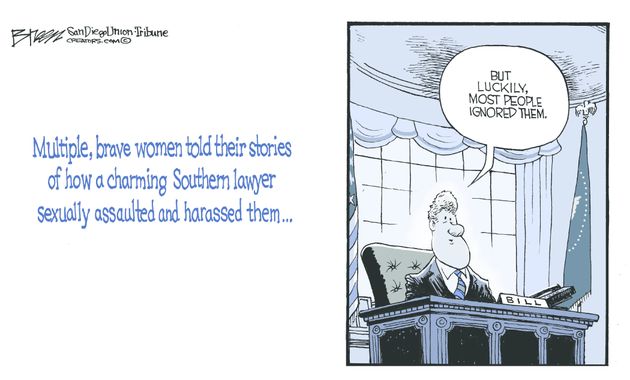


Looking Good!
1/16/18
Erma Bombeck was a humor columnist who wrote about life as a housewife. She's the author of many books including Womanhood: the Second Oldest Profession, and Please Don't Eat the Daisies.Her mom would read her column every week in the newspaper, checking the stock photo that was printed with it to see how her daughter was doing. Sometimes the particular run of the paper had lighter ink or other variations and she'd comment to Erma that she wasn't looking so well that week.
See, that's funny because . . .
Or maybe that she would comment that Erma was looking full of vigor if the photo looked particularly sharp. (Said commenting was done by phone, through an ancient technique called the long distance call, or by letter).
Our brains are conditioned to evaluate other humans when we interact. How is this person responding to what's happening in this conversation? How do they feel? Maybe on a deep level that analysis is still operating when our higher brain knows the indicators aren't valid.
I'd venture to say a lot of people have as many conversations not in person—not even vocally—as they do face to face with other humans. But eons of conditioning haven't changed our brain's scanning for cues.
You've probably observed that the profile picture of a person colors your interpretation of the post. That's why I'm constantly getting friend requests with profile pictures of sexy girls with their boobs popping out. I have to remind myself that it's really an obese, sweaty millennial looking for my credit card number.
And you've probably observed how an emoji can completely change the texture of a conversation. And it may or may not be genuine.
And you've probably experienced the misunderstood text, because a text can't convey the mischievous twinkle in the eye and the "JK" grin. And adding that to the comment kind of undermines the whole understated humor of the thing. (Like saying "See, that's funny because . . .")
Then, maybe you've experienced the situation where one person uses a certain emoji and you equate it with his or her personality. Then another person uses the same one and there's a little bit of a cognitive disconnect in the communication—like one person's voice coming out of another person's face.
I wonder if we understand the effect of this type of communication on our psyches. I'm not saying that it's necessary to understand that, but I do think that it's part of what molds our thinking.
The Peasants are Revolting!
The basic theme I'm following on this Chautauqua is the human brain vs. machine thinking. The emojis and profile picture examples are human brains doing what they do.Glenn Beck was talking about Project Veritas and the Twitter deal they uncovered, where they are shadow banning communications that might not support their political leanings.
Glenn Beck was absolutely right about this. James O'Keefe uncovers some great stuff, but his methods make me really uncomfortable, and frankly undermine his credibility a little.For the purposes of our discussion the point of O'Keefe's revelation is the way that technologies have taken over human interactions. One of the fundamental principle of our society is "democracy." (Simmer down, you guys, I hate the 17th Amendment as much as you do. I'm talking about the principle of doing the business of our society by the Voice of the People. Sheesh.) So we kind of tune in to what everyone kind of thinks on things. We may try to overcome it, "I don't care what anyone thinks," but it's inherent in our nature and advertisers and others bank on the fact that a large percentage of people are susceptible to it.But we have technologies that skew that. Using bots and algorithms ten people can sound like 10,000 voices expressing a view. Literally, 10 people can use bots to generate 10,000 unique posts and e-mails and various communications, making it seem like there's a groundswell of support or opposition for something that only a few people want to control.
That ain't right.
I'll tell you why it's not. The fundamental principle of humanity is Free Will. And we exercise our will based on information we have. If you pervert that, you are corrupting a fundamental principle of the universe.
Media Matters is collaborating with Twitter, unifying forces to take down the threat of Free Thought in this country. Now, Media Matters is an insanely evil organization. They are despicable because they commit the worst sin—trying to take away Free Will. They are, at their core, bullies. They would have you think like they do without your choosing.
Everything evil you can think of involves taking away someone's choice from them.
If you are crafting a story a great trigger for homicidal behavior in your protagonist is the sneering phrase "What are you going to do about it?" Nothing creates a more visceral reaction than the threat of removing the most fundamental thing that makes you human—Free Will.
Sorry, got a little carried away. Breathe, Frank. Breathe.
Point is, bots and other technologies are creating our views. And our views create our choices.
The Robots are Coming!
Again, if you know and love Glenn Beck the way I do, you appreciate when he takes a break and turns it over to his sidekicks. It's paradoxical but true.'Cause the guy is depressing. Everything is a portent of impending doom. The depressing thing is that he's usually right. He sees the way things are going to happen.
He really does. And it's not always the end of the world. One example is the way we watch television. I didn't even know what he was talking about when he predicted that we wouldn't sit down in front of one the networks on Thursday nights at 7:00 to watch our favorite show. And now we do it the way he predicted we would.
But the doom just wears on you sometimes.
I've developed a coping mechanism. It's all about perspective. I've decided to spare you the details; I'll bore you about it another time. But rough times are both worse and better when you're in them than when you're imagining them. Like imagine taking a page of today's paper back in time.
The deal I've made fun of Beck on is his idea that A.I. is going to become self-aware and start making decisions that harm humans. It seems ridiculous. Just like when Beck was worried that Donald Trump would win the Republican nomination. Just ludicrous.
Actually, I find paranoia to be a very defensible position.
I'm struggling to phrase this succinctly. The basic idea is that humans have limitations that computers don't, limitations in terms of speed and volume of processing.
Think of it this way: Most of the time you spend on the computer the processors are idle (except for those maddening times when they're not. Grrrrrr!)
Sorry, for the aside, you know exactly what I mean. If you're running a design program with the task manager performance window open you can see that at times you're pegging the processors (and your blood pressure) while the computer is trying to catch up. But for the most part, like right now when I'm typing, I type a character and the computer processes it in 5 milliseconds then twiddles its thumbs waiting 600 milliseconds for me to type in the next character. When I watch Ironman I'm more amazed at the way Stark can interact with the technology than at the technology itself.
I hope I'm conveying the concept. The power of the computer, in a certain sense, is limited by the human's ability to use it. Take this illustration as it is intended. When you run some analyses, like FEA, you set up the problem then go home for the evening while the computer works it out. You're ahead of the computer. But you're not doing the work, either. But you are making the decisions of what work to do.
In that example imagine yourself calculating the same elements. Instead of the 8 hours the computer takes you'd be lucky to do it in 8 years.
So we're converging on the idea. Even with the finite element analysis the computer is crunching the setup you gave it. It is only doing what you told it to do, the old GIGO.
So the idea behind Beck's concern is that in order to get the maximum benefit from computers we have to unleash them. We have to let them process well beyond what we can keep up with.
Running a powerful spreadsheet or program is one thing, in the case where the program is doing the heavy lifting but you still control what it's doing.
To really get the benefit of the technology it can't be shackled by your limitations. It has to start making decisions while you're still stuck processing—figuring out what you want it to do.
That's where Beck gets concerned. The computers are doing the heavy lifting but we're still directing them. Their performance is limited to our capacity. So at some point we have to turn them loose to get the maximum benefit. And by necessity and definition they will be outrunning us.
And they will have to be making decisions without us. That's the point.
Danger Will Robinson!
So let's merge the last two points.You set up the computer, you program it to make decisions, then you turn it loose.
What kind of decisions is it going to make?
Well, that depends on who programmed it, doesn't it?
If Media Matters and the Michael Moore-ons of the world have set the guidelines on those decisions, do you think you're going to like the outcome? Those are the bullies who are making the decisions right now on what kind of information gets through your smart phone.
I've told you about the most dangerous cliff in the park. It's not the one with the abrupt drop. It's the one that gradually gets steeper.
I'm not an alarmist, but it makes no sense to sound the warning after you can't do anything about it.
Unleash the Power!
So I make fun of Glenn's paranoia, but out of the other side of my mouth I am crying from the rooftops that humans can't cure cancer.You know what can?
The kinds of algorithms Facebook uses. Not kidding.
For about two years I bored every doctor at the Bone Marrow Clinic with my theories about mathematically based cancer treatments. I got the pat on the head, cute little boy. Adorable, his little ideas on medicine. They explained about the need for double-blind studies and control groups and including all the variables and I had to stifle a scream. "That's the whole point! You can never get there with full factorial analyses of all the variables! That. Is. The. Point!"
. . . how bored do you want to be?
See, if you have a human looking at stuff that's what he does. Full factorials, double-blind studies. Things that take for-freaking-ever while cancer patients continue to die. There is literally not enough time to compile and calculate the data you need. As many cancer patients as there are now, there would have to be 100X more for you to get enough data in 100 years to solve the problem.
You have to know things that you don't have data on.
Okay, quit reading now. It's going to get excruciatingly boring.
How much do you pay for your Facebook account? What? Nothing?
Well how come Mark Zuckermeisterberger Whatsisbucket is a billionaire? How in the name of Dale P. Earnhardt does he rake in the kind of cash he does if none of his customers are paying him?
Because what you give him is more valuable than what he's giving you.
You're giving him information. But the secret is that you are giving him information you don't know you're giving him. He knows things about you that you haven't told him (and I call Glenn Beck paranoid!).
Hear me out on this (since you ignored my advice to quit reading).
The people he sells your information to know that if you grew up in a small town and you prefer Coke over Pepsi you are more likely to respond to an ad for a Dodge than for a Chevy . . . for example. They can triangulate and use Bayesian algorithms and probability to figure out things you haven't told them.
Point is, one more time, you have to know things that you don't have direct information on.
How does a doctor currently know you're allergic to something? Because he gave it to you and you had a reaction. That's direct information. Does that seem like the smartest way to do that?
Oops. Dude died. I guess he was allergic to that.
I'm not crazy, I'm really . . . well, I most certainly am crazy, but I'm not wrong about this. If you slice the data correctly—or more to the point, if you allow a computer to slice it correctly because you just plain are not capable—you could predict allergies and other things based on factors that seem totally unrelated.
Add analysis of DNA and you can cure cancer.
But humans can't do it. Not even human mathematicians. You have to unleash intelligent, self-learning algorithms, and you have to do what they tell you rather than the other way around.
I'm done here. Geez, I've got a headache.
Math Ahead!
Here is a very basic example of what I'm talking about. Let's say you have a table of the position of a vehicle over time. It was at point A, then at another time it was at point B, then at point C . . .You have distance. That's the information you have. What if I asked you about the speed of the vehicle? Well, you don't have that. I haven't told you that.
No, but you can easily calculate it. Because you also have time. What about acceleration? Same thing. You can calculate it.
What about power? Now you're talking crazy.
Well, you have the acceleration, why can't you know the power? Because, Frank, you don't have the mass. Duh.
But you know a range—you have a probability of what the mass is. You know what most cars weigh.
This is a very rudimentary example, but it's warming you up to the concept. You don't just use the data you have, you use how the data has changed and—this is key—probabilities based on other data you have.
This is how drillers control Oil & Gas drill bits. They know the RPM of the drill string and how fast the pipe is being fed and how much weight they have on it. They also know the torque they're delivering to the drill string.
But keep track of how those are changing over time and with relation to each other, then combine them with the way you've seen the drill string behave in the past, and you wouldn't believe the information they can know about the formation. Information they have no way of measuring directly.
Red Pill or Blue Pill?
Sorry, couldn't come up with a title that used an exclamation point.The Matrix is key to our discussion here. First, we are victims (What's a less harsh word for victim? Product?) of the information that we have available. If we were living in The Matrix, how would we know? How do you know that the news you're consuming is real? Were you there? Do you know someone you trust who was there? How well can you trust that person?
My problem is that I would immediately forget and be confused. "Wait! What did the blue pill do again? Hold on, explain that to me again." After five minutes of thought and discussion I'd still have no idea which pill I was taking. I am honestly that dumb.But the kind of matrix I'm talking about is the Taguchi Matrix. Or, if you prefer the more generalized version, the orthogonal array.Look it up if you care, R.A. Fisher, orthogonal arrays, Taguchi matrices (also DOE or Design of Experiments) . . .
But I'll tell you my story about it.
I got into cars as a teenager, read the magazines, tinkered with cars and making them go faster. The cardinal rule of making changes was that you only change one thing at a time. Because otherwise you lose track of what effect the change had.
Makes sense. You change the carb jets and the heat range of the plugs and the car goes faster by .2 seconds. But maybe one change hurt you by .1 and the other helped by .3 seconds. You don't have any way of knowing. You've gotta' make one change at a time and keep track of the results.
You'll recognize this as where the medical industry is.
Then when I was in college (this actually happened at work, not in school, but I was in college at the time. Like you care.) I learned about Taguchi matrices.
The problem with changing one variable at a time is that is takes too long. And while you're running all the experiments other variables you can't control change, for example in the case of the car the track warms up and the air temperature gets colder.
So here's the basic idea. (I actually wrote an article for National Dragster on this, but I can't get my hands on the electronic copy right now.)
Let's say you have 3 variables with two different levels each. You've got two different carb jets, two different spark plugs, two different tire pressures you want to test.
To run all of those combinations would take 2^3 or 8 runs. That's doable, theoretically, but not easy, as you know if you've ever spent any time in the staging lanes at a drag strip. But if you add just one more variable all of a sudden you're looking at 16 runs. Then if you have more than 2 levels for any or all of the variables . . . it gets messy in a hurry.
Here's the magic trick. You can set up a fraction of those tests and still get the best combination. For example, with five variables of two levels each (32 combinations) you can determine the best combination with 8 experiments. The trick is in which variables you test in which combination.
The thing that struck me as magical was that the ideal combination has a 75% chance of being one that you didn't test. You are getting information about things you didn't test. Good information. Valid information.
Anyway . . .
That opened a window for me. The power of math to shake Nature's secrets out of her.
Paranoid much?
In a previous blog post we talked about paranoia. Here's one for you.Have you ever signed up for identity theft protection? Yeah, so these people you don't know (the identity theft company) are charging you for keeping your identity safe. To help them do that you go online (online!) and tell them every detail about all your financial accounts and social media accounts and every secret your hairdresser doesn't even know.
If I'm an identity thief looking for that information that's the first place I'm going to go.
Hey! I'll keep your identity safe! Just tell me all of your sensitive information so I can do that!
Just a thought.
I Once Was Blind, but Now . . .
I was the project manager for the boss's favorite vision for a while. A typical weekly meeting consisted of him coming in and saying he had been wrong about the fundamentals of the concept. He had looked over what we had developed and thought about the underlying principles and he can't believe he missed this element that changed everything and now he had it figured out and this was the way it was supposed to be.Next week same thing.
That's the nature of life, the nature of progress.
Almost everything I have figured out today is different than I had all figured out before (which was different than it was before that). And I know that everything that I understand right now is going to look silly at some point in the future when I really understand it and look back on now.
I'm not sure where I was going when I made this note. I think it came from a conference I attended a couple of weeks ago and the keynote speaker was explaining this new model of understanding stuff. The sub-text of the talk was that our former understanding of the topic was all wrong, ha-hah, silly us, and now it all makes sense.
You know the deal. Next conference we'll shake our heads at how misguided we were when we were basing our understanding on that model.
A few years ago Al Gore was chuckling about how brain damaged conservatives were, citing a study that showed that conservative and liberal brains were wired differently; that conservatives were neurologically pre-disposed to resist change. And we all know how horrible that is!
(Oh, sure, now they love studies about how the brain works. They ran off that Harvard professor for citing one of those studies.)
In my own defense I'm going to point out that all progress involves change, but not all change is progress. I think that Al Gore and his liberal friends suffer from a chronic case of what the eminent and distinguished blogger Frank Leany cleverly terms as the This is Not That fallacy.
But, as an indictment of myself I'm going to say that the study probably has merit. I struggle with change, even when it means progress. I am reluctant to lightly discard something that has value, and I'm still not convinced that's a bad thing. (Tune in to the next conference to see if I've evolved.) But that means I often hang onto things that no longer do have value. I hope you never look in my closet and see all the knick knacks I've picked up over the years that I might someday find a use for.
The boss's project really did need revamping every week, and the fact that we had worked our keisters off getting it the way he wanted before had no impact on that fact.
But what kind of hung around in the back of my mind after that presentation at the conference was that uneasiness that we never really ever know anything. That's the anxiety caused by that conservative chip in my brain. I just have this desire to diagram the new model, close the notebook and think "Good thing we put that one to bed. The Cosmos is in order."
Life is messy. There is no order.
Internal irony here, the topic the speaker was explaining involved moving through "uncomfortable" to find "comfort."
Look! A dead horse!
I've told you about my view on conspiracy theories. Some people need to perceive order in the universe and an evil entity controlling things is order. A council of crazy men meeting in a dark-paneled lodge to cause evil is more comforting than the truth. The truth is no one is in control. Doctors can't cure you, presenters don't have the final answer, and nothing makes sense.The study about differences in brains makes sense (after I've just told you nothing does). It rings true. I've seen it. I've dealt with people who subscribe to conspiracy theories, and they tend to see the world in black and white. It's simple. It's neat. It's orderly.
Democrats are bad. Libertarians are good. This is what's causing the bad yield on the parts, no more discussion required. God loves people who drive American built cars more. Well, that one is true.
Being closed minded is easier. It's much less confusing. It's actually more efficient. You see the way it is, and you move on. No more consideration required.
People who can see both sides are apt to get caught up in weighing relative merits. They get paralysis by analysis.
The disease of Perfection.
I'm getting worn out here. If I'm losing interest you've got to be looking for something to cut your wrists with.God grant me the serenity to accept the things I cannot change, the courage to change the things I can, and the wisdom to know the difference.
It's a constant battle. This is not that. The elusive happy medium.
Some time ago I read a blog about the Disease of Perfection. The guy was talking about the anxiety we feel, especially that the youth feel, to perform and achieve. It causes all kinds of problems.
Yeah, but so does being a slacker.
See what I mean about open-mindedness causing confusion? Slackers are bad. Move on. Or over-achievers are bad. Relax. It's so much simpler to not consider all the possibilities.
So what's the answer? We don't want our kids being depressed because they got a bad grade. But we don't want them blowing off trying to be better.
Hey, don't look at me. If I had all the answers I'd have a blog or something.
It's stressing me out to leave this so woefully unexplored, but I'm done here.
To Intervene or Not To Intervene?
Item 327 on the list of things Frank sucks at: Knowing when to interact with fellow humans.I see a woman I work with leaving work, she looks upset. You know the look. Nose is red like she’s been crying or trying not to cry.
Something like 15 minutes later I go out to my car and she’s in hers and through the windshield it looks like she’s crying. She sees me and holds her fist to her mouth—you know the move. She’s crying.
Broke my heart. I almost walked over to her door to ask the dumbest question in the world “Is everything all right?"
But then I thought "Okay, Frank, if you’re crying in your car do you want someone you work with to approach you?"
The next day I went up to her office to see if I could help, but she was busy. Later I thought better of it and never went back. She seemed okay. She is okay.
But I never know.
How do you know whether or not to approach a person who seems like they need to know someone cares?
We (Y chromosome owners) have a very limited sense of what it’s like to navigate the world as a woman. In some ways I understand that it can feel like you’re a walking target. Men are basically just life support systems for a testosterone factory. (I think it’s called the Bill Clinton Syndrome)
But humans have an inherent need for interpersonal reaction.
So it kind of boils down to the age old human dance: Attempting to understand the needs of another consciousness using the clunky tools of communication that mortality provides us.
Okay, here's a silly example. I saw a women in a parking lot riding a shopping cart. You know, foot on the bar and the other foot up, hunched over the handles for balance rolling to her car. I smiled and she kind of looked sheepish (not a teenager, like late 20s early 30s).
After I passed I had the forehead palm moment. I wish I had said “I like you!” and continued to my car.
Because I did. I immediately liked her. I thought that was a wonderful thing for a person to do, enjoying life.
That wasn’t confusion, that was just Frank’s standard problem of molasses slow reflexes.
The best way to I've found to know what the right thing to do was is to do the wrong thing.
Hoaxes
1.11.18
Among his predictions of the doom that awaits us, Glenn Beck is concerned about AI (Artificial Intelligence) machines becoming self-aware and taking over humans.I sound like I'm bashing Glenn Beck, but if you know and love him like I do you are aware of his propensity for scanning the horizon and detecting assorted scenarios of doom. It's actually pretty insightful, and he's not always wrong. He's predicted 25 of the last two global catastrophes.
Again, if you listen to him as much as I do you've heard him say "They laughed when I said thus and such on this and that date, but look what's happening now." So either he gets it right or he knows we're not going to go back and check that he never predicted that. It's pretty safe to bet on the game after the final whistle blows. I think that's called a "Dalton." If you've read the Chronicles you might know why.Beck predicts that this year AI will generate a hoax, like and audio or video file, that will be pretty much universally believed.I really do love Glenn Beck. I believe he's genuinely concerned about the future and it makes me sad to imagine the burdens he bears because of what he sees in the tea leaves.
I get it. You would pee your pants if you could climb inside my brain and see the demons that I visualize on my path forward waiting to attack me in diverse and sundry creative ways. I wish I were kidding.
I don't know about AI generating that, but we will definitely see an increase in the quantity and quality of hoaxes as time goes one. But the point of this post (and not a moment too soon!) is that Beck talks about the “imprint never being erased.” Even after it's proven to be a hoax. He's absolutely right about that.
It's true. That's the danger of this stuff (like gossip): Even when you know it's not real it sticks in your mind.
During the 2008 election an e-mail was going around from a guy who said he was a soldier in a unit in Iraq and he got assigned to do security for the John McCain visit. He was in a mess tent before the speaking event and McCain was basically incoherent and babbling and then one of McCain's guys said the soldier had to leave because McCain had messed himself and they needed to clean him up for the speech. But before he left he saw them give McCain an injection and the Senator became lucid and aware and . . . you get the picture.
Completely fabricated from the first sentence where the person said he was a soldier. Not one word in the entire e-mail had any basis in fact, but the person who sent it to me believed it and people he sent it to believed it.
Really? They gave him an injection and he woke up and became coherent? Someone should tell Chuck Shumer and Nancy Pelosi about this magic potion.
But here's the deal. I've listened to Phil Hendrie. I've listened to George Norry. I've even listened to the guy who sent me the e-mail, who believes every hoax even when the truth makes a better story. I understand that it's physically possible to put words together that have no basis in truth.
But during that campaign I found myself remembering the fictitious story whenever I thought about John McCain.
Isn't that crazy?!
Ann Coulter
I was curious to see Ann Coulter’s take on what Trump is doing with DACA. So I went to Townhall.com yesterday and looked up her column. This after a year of not reading her columns and not missing her.My faithful imaginary readers know that every Thursday morning I used to read Ann Coulter's column before I did anything else. That was my (weekly) morning cup of coffee. But that was before she lost her mind.
While reading her column yesterday I remembered why I always used to enjoy her columns. But I have to admit that I look at them differently now. I don’t just accept her take on it as valid out of hand. Everything she says I take with a 50 pound bag of salt now.
Today she explained that she only thought she loved Trump, and Bannon was actually his brain.
So . . . yeah . . . that's interesting.
So my Thursday mornings are still free.
Also, I like Townhall.com, although I’ve spent very little time on the site in the past year (a site I used to visit daily, sometimes multiple times a day). But the "Promoted Stories" they allow to show up at the bottom are pure sleaze and really drag down the quality and credibility of the site. Just grimy.
Shame on you Townhall.
Toons



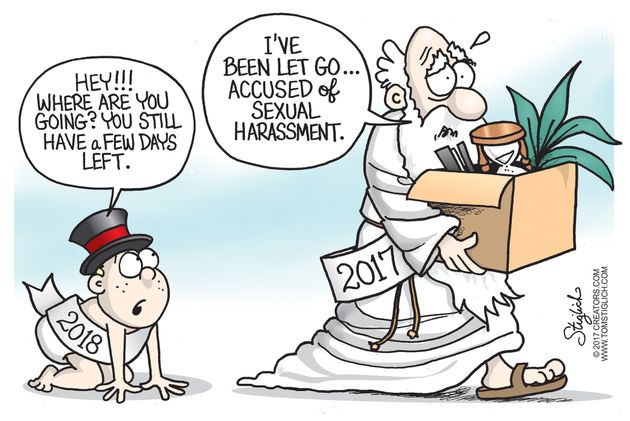


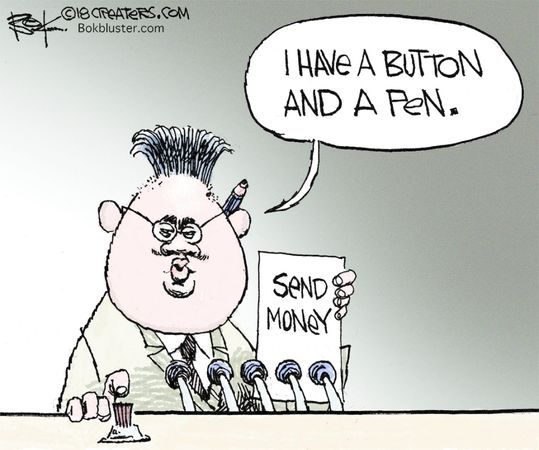
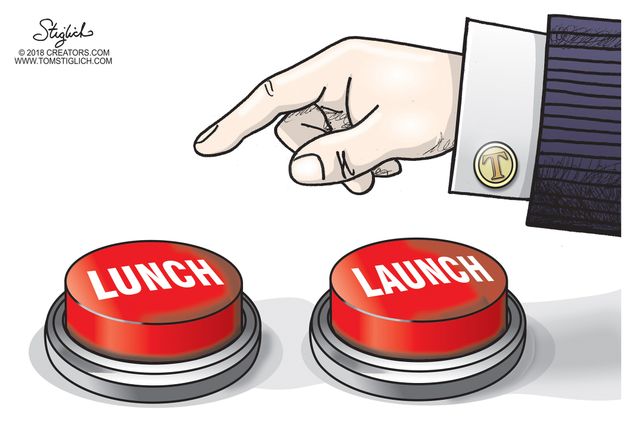
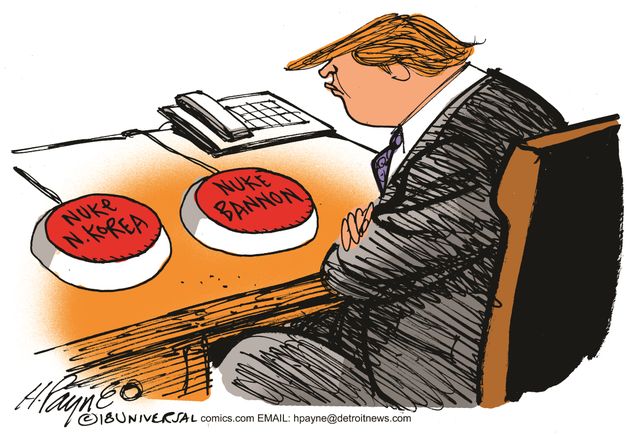


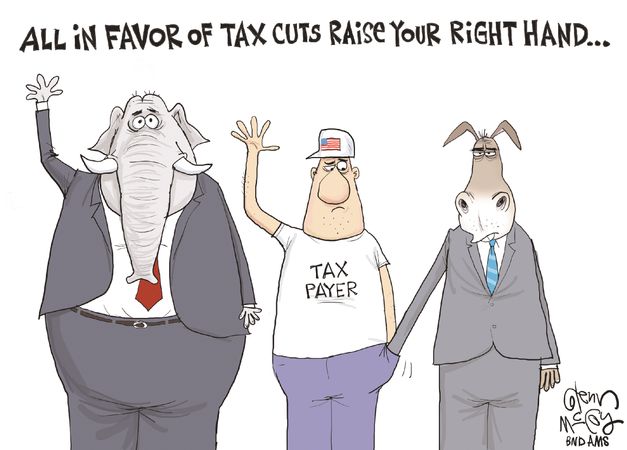







Okay, this is why I voted for a ridiculous, childish, loudmouth lout, and I have no apologies. I love what he did with Jerusalem, loved the way he called out the UN.
I really wish he weren't childish and an embarrassment. But the people who aren't weren't getting the job done.


I have no idea what this means, but the visual technique is cool

Same kind of deal, different artist

Click "Prev" below to go to earlier posts
